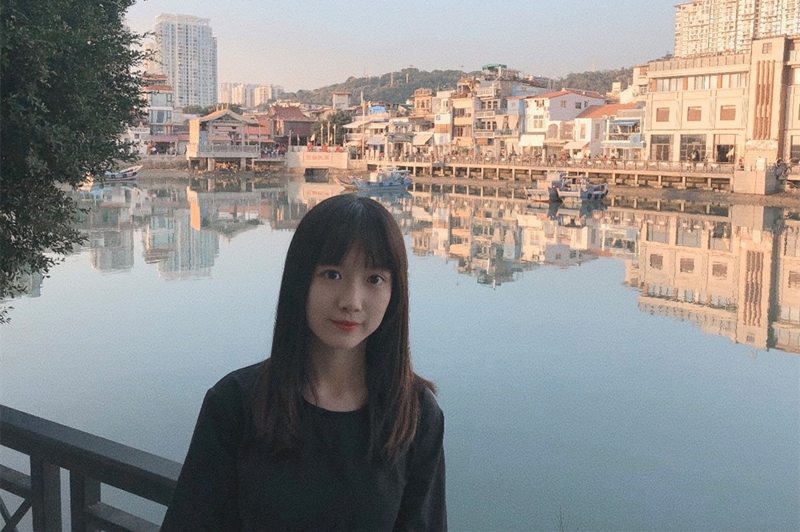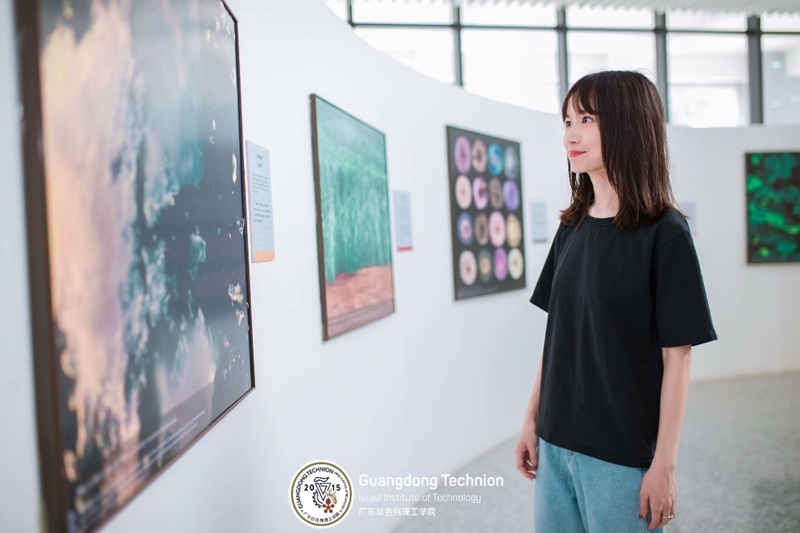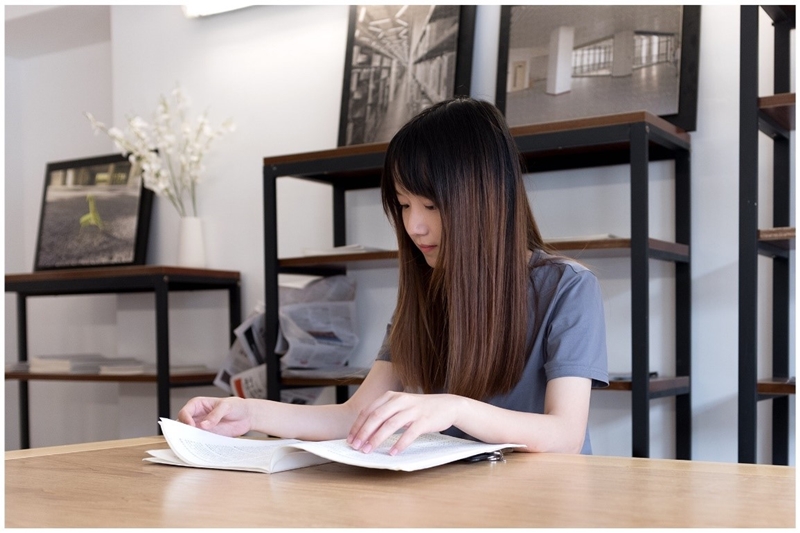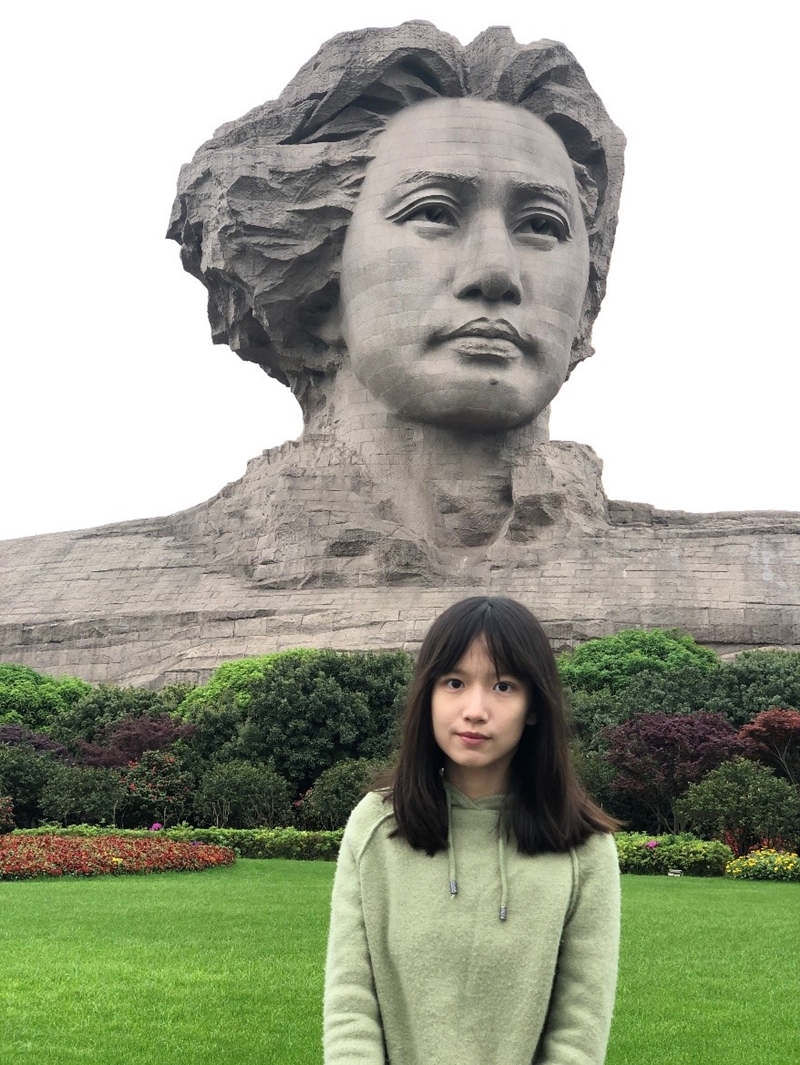PostTime:5/10/2021
This June, the first cohort students will graduate from Guangdong Technion - Israel Institute of Technology. The series of interviews with the graduates from Class 2021 will show their stories with GTIIT in the past four years. Here is the story about Lin Huizi, a student of Class 2021 from Materials Science and Engineering Program.

Name: Lin Huizi
High school: Chaoyang Experimental School, Shantou
Program: Materials Science and Engineering
"I love working on all kinds of mathematical problems and enjoy the process of solving them. The satisfaction I get from solving a problem is beyond words!" To Lin Huizi, mathematics and physics form a huge magnetic field attracting her irresistibly. Since her childhood, remote control, vacuum cleaners and other household appliances had become toys. She always immersed herself into exploring the scientific principles embedded into these appliances and got a lot of fun from them.
Overcoming weakness and confusion
As a local student who has been living and studying in Shantou for 18 years, Lin Huizi preferred to study in other provinces to experience different life and culture when she made university choice after the college entrance examination. "However, my father suggested me to stay in Shantou to complete undergraduate study. He said I need to enrich myself in the four years for better pursuing further studies abroad. By careful consideration, I thought what my father said were reasonable. Meanwhile, I learned that GTIIT is the Chinese campus of the Technion, a world-renowned higher educational institution in science and technology. The birth of GTIIT impressed me greatly as I had been fond of science-related subjects since childhood. In the end, I put GTIIT as my first choice and was admitted."
Lin Huizi was no exception to the fear of English teaching environment and speaking out in front of people that many students had when they first entered GTIIT. "English was my weak subject in high school, so at first I was worried that I could not adapt to the English teaching environment. Thanks to the preparatory semester, I could get used to it gradually. English, mathematics and physics classes were offered in English in the preparatory semester. The math and physics courses were not difficult, most of which were learned in high school. The main purpose of these courses was to help us master the basic professional vocabulary." Lin Huizi was grateful to her teachers at GTIIT for encouraging her when she was unconfident of herself. "I was worried about my pronunciation. When I talked to Gloria, the English teacher, about my confusion, she told me that I should not stop speaking English just because of my fear of accent. She encouraged me to try more to improve myself." The voluntary discussion groups and English classes open for GTIIT students also helped Lin Huizi overcome her fear of English. Gradually, Lin Huizi's resistance to public speaking has disappeared after a variety of presentations in class. " I feel like I've made a lot of progresses compared to four years ago. I believe I can have better performance in my future study and career."
Lin Huizi said that GTIIT’s curriculum provided her plenty of time to explore knowledge interests. "The courses we had in the first year were mainly basic courses, while the second year started with specialized courses. The specialized courses were further divided into various branches, such as polymer materials, ceramics and refractories, electronic materials properties, composite materials engineering, metal properties and applications, etc. It was much effective to find what I really loved and continue in-depth study after extensive study of material-related subjects in different branches."
In the four years, Lin Huizi seized opportunities to visit enterprises, combining her interests with career plan to consider future development comprehensively. In the first semester of her sophomore year, Lin Huizi joined a GTIIT team to visit the Esquel Group. “It is a famous textile and clothing manufacturer. We learned about the design principles of shirt products in the R&D center, the application of intelligent automation in industry in the production line, and the recycle process of industrial wastewater in the water purification center. Such an opportunity allowed me to see the application of what I had learned in real life, and also push me to think about my future career."
Four years have passed, and Lin Huizi was surprised to find that the weakness and confusion she had before have disappeared. Now she has the ability and courage to better explore knowledge.

Rigor is the fundamental respect for research
"Rigor and comprehensiveness are essential attitudes in scientific research, as the published articles may become references to others' research. Every step in research must be taken seriously." As a student major in science and technology program, Lin Huizi knows the importance of rigorous academic spirit in scientific research.
In the second semester of her sophomore year, Lin Huizi joined the professor's research group and participated in two research projects. "The first project is to explore the influence of the pressure applied by the tip of the probe station on the probe bench on the characterization of memristors, and to explore the different kinds of resistives switching of memristors made of different materials. This was the first time for me to experience the scientific research process personally. I participated in the whole process of preparing the memristor sample, characterizing the memristor, analyzing data, reporting research results, and doing supplementary experiments to improve the experimental results so as to draw more rigorous experimental conclusions. This project will also be the main content of my graduation thesis."
The experience of participating in scientific research for the first time impressed Lin Huizi deeply that research is such a serious and difficult process. "The investigation of memristor resistance phenomenon is usually based on analyzing the properties of hundreds of memristors, and analyzing each memristor needs to explore dozens or even hundreds of times of resistive switching phenomenon in order to avoid contingency and reach rigorous conclusions." After more than a year of efforts, Lin Huizi, as the second author, published a paper in the well-known journal Advanced Electronic Materials.
The sense of research achievement for the first time gave Lin Huizi a firm belief of devoting herself into scientific research. "The second project is to explore the coexistence of digital and analog resistive switching in memristors. In the characterization process, there are many parameters that need to be set, such as current limitation, voltage range, amplitude, etc. During the measurement process, I need to constantly adjust the fumble based on the results of the experiment." Lin Huizi said that it was a tough process, but she enjoyed it. "Learning by trying is a challenge in itself!"
According to Lin Huizi, there are a variety of ways to assess students’ academic performance at GTIIT, including assignments, exams, presentations and projects. The course impressed her the most was From Functional Materials to Devices, which required students to complete two projects. "One project is to make piezoelectric materials with high piezoelectric properties. Searching information of the properties of piezoelectric materials and their preparation process, purchasing raw materials, preparing materials, improving the preparation method, measuring piezoelectric properties... The process can be a very comprehensive review of our capabilities in all aspects.
The other project is more interesting. It involves making an object with the knowledge of magnetism and electricity learned in class, which combines professional knowledge with our daily life. Our group thinks that children may be afraid of the dark when they go to bed at night, but it costs a lot of electricity to keep the light on all night, so we decide to make a light-controlled lamp with timing function -- when the environment becomes dark, the light will turn on automatically and turn off automatically after a period of time, and the users can control how long the lights are on." Lin Huizi recalled the difficulties she encountered in this project -- how to make a light-controlled lamp, how to make a lamp that can be timed, and how to combine the two modes together... "The sense of achievement when you finally made it was very different from a high score in an exam!"

Pursue love under the guidance of model
Lin Huizi has moved forward firmly under the power of model. "Ms. Silvia Behar Harpaz was my teacher from preparatory semester to sophomore year and she is a model for me throughout my university years." Silvia started her career at the Large Hadron Collider in Switzerland, while she took up teaching at Technion after she found that teaching was what she really loved. "She said that teaching at GTIIT was her exploration to the world. She wanted to open her eyes and learn about different cultures. I admire her for her courage to pursue her love. She has done a good job no matter in research or teaching. Her story inspires me to do the best in everything I want to do."
Related reading: Physics | Silvia Behar Harpaz:教学是我的挚爱
https://mp.weixin.qq.com/s?__biz=MzI1NjY0NTMyNA==&mid=2247485522&idx=1&sn=6f42bff60feaa8e873969ae134200ed6&chksm=ea22c9f1dd5540e710105344d677138da3dee46fb60f3a1c51f4737701214127676263ce70ac&scene=21#wechat_redirect
Lin Huizi plans to pursue further studies in the field of electronic materials after graduation. So far, she has received offers from many overseas universities, including the University of California at Berkeley, Northwestern University, Washington University in St. Louis, National University of Singapore, the University of Manchester, etc.
"When applying for postgraduate universities, I felt that my advantages are the academic background of Technion and my research experiences. The universities in the UK require students to reach the qualified GPA scores for a formal offer when they send the conditional offers. Their requirements for GTIIT students are the same or even lower than those for students from ‘985 Project’ universities in China. For example, the University of Manchester requires me to achieve a GPA of 70, while their requirement for most ‘985 Project' universities in China is 75."
Lin Huizi said that she could often talk with professors and get valuable research opportunities at GTIIT. "Research experience is a shining point when I apply for postgraduate universities, especially for universities in the USA. I am very grateful to the professors at GTIIT for writing recommendation letter for me, and the helpful suggestions given by Dr. Chen Fen and my classmates."
Lin Huizi sincerely hopes that junior students can find out what they are passionate about. "A good GPA may be helpful for the application, but we should also remember to enrich ourselves constantly. Pursuing what we love is the most important thing."

Text: GTIIT News & Public Affairs
Photos: Lin Huizi, GTIIT News & Public Affairs
© GUANGDONG TECHNION-ISRAEL INSTITUTE OF TECHNOLOGY | 粤ICP备17036470号
